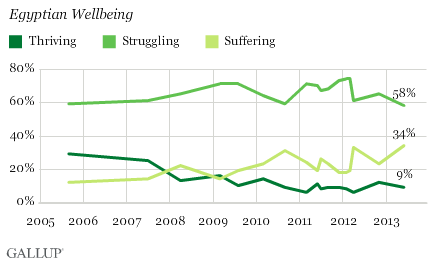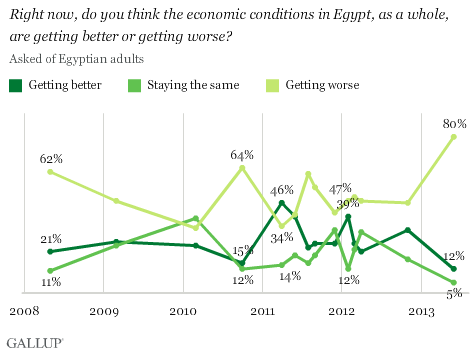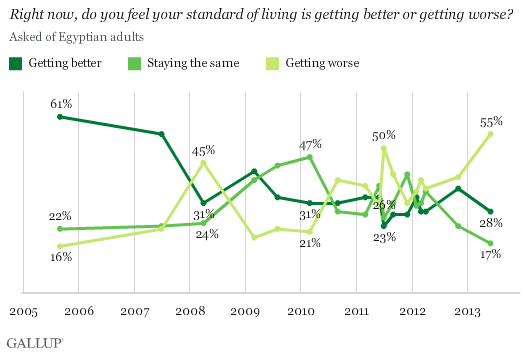This article is the second in a series based on results from Gallup's polling in Egypt two weeks before former President Mohamed Morsi was deposed in July 2013.
WASHINGTON, D.C. -- Egyptians gave their lives some of the worst ratings they ever have in the weeks leading up to former President Mohamed Morsi's removal from office. The 34% of Egyptians who rated their lives poorly enough to be considered suffering in June was up from 23% in January. Fewer than one in 10 rated their lives positively enough to be considered thriving.

Gallup classifies respondents as thriving, struggling, or suffering, according to how they rate their current and future lives on a ladder scale with steps numbered from zero to 10 based on the Cantril Self-Anchoring Striving Scale. Those who rate their present life a 7 or higher and their life in five years an 8 or higher are classified as thriving, while those who rate both dimensions a 4 or lower are considered suffering. Respondents whose ratings fall in between are considered struggling.
One of the basic underpinnings of the uprisings that lead to former President Hosni Mubarak's resignation in 2011 was a persistent lack of economic opportunities in the country. Since Mubarak's removal, the stagnant economy forced the country's transitioning governments to rely heavily on the foreign reserves. When Mubarak resigned from office, the country held nearly $36 billion, an amount that has now dwindled down to slightly less than $15 billion. Since January, the budget deficit has run at about $3 billion per month.
Despite hopes that Morsi would quickly turn around the economic situation, some analysts viewed his government as unable to get the economy heading in the right direction. In late June 2013, Egyptians seemed to confirm this assessment. When asked about the state of their national economy days before Morsi's ouster, a record 80% of Egyptians described it as getting worse.

Perceptions of Standard of Living Worsen
From national to personal assessments, Egyptians highlight the challenges their country has faced in the past several years. Since 2005, Egyptians' assessments of their standard of living have gradually gotten worse, with some peaks and valleys. Yet several weeks before Morsi's ouster, Egyptians were more likely than ever to say that their standard of living was getting worse, with an all-time high of 55% saying their situations were getting worse.

Further reflecting such perceptions on standard of living, many Egyptians also express difficulty getting access to basic needs. One in four Egyptians (25%) said there was a time in the past year when they did not have enough money to provide adequate shelter or housing for themselves or their families. More than four in 10 (42%) said there were times in the past 12 months when they did not have enough money to buy food that their family needed.
Implications
As the country faces its most serious political crisis in many generations, a near-record percentage of Egyptians are pessimistic about their lives and the direction of their nation's economy. With so much uncertainty weighing on many Egyptians' minds, the country's current leadership must succeed in ending the current political standoff and refocus the nation on economic recovery. The country remains in dire need of domestic and foreign investment and access to capital for small and medium-sized enterprises in a credit-starved private sector.
While several Gulf Cooperation Council (GCC) countries offered $12 billion in aid shortly after Morsi's removal, those funds were primarily bond purchases and energy credits. Most analysts expect such measures will do little in the short and medium term to stimulate real growth and economic opportunities in Egypt. The interim government has already indicated it will not attempt to pursue the International Monetary Fund negotiations, leaving that task for Cairo's next elected government. Thus, despite relieving the national budget pocket book from catastrophe, the average citizen will likely see little relief.
However, the interim government has announced a potential "Marshall Plan" for the short term that would build on the goodwill of GCC country investors and spur investment in a series of major infrastructure projects. The government hopes such plans will create some badly needed employment opportunities and attract foreign investors down the road.
For complete data sets or custom research from the more than 150 countries Gallup continually surveys, please contact us.
Survey Methods
Results are based on face-to-face interviews with 1,149 adults, aged 15 and older, conducted in June 12-19, 2013, in Egypt. For results based on the total sample of national adults, one can say with 95% confidence that the maximum margin of sampling error is ± 3.3 percentage points. Results for the 2005, 2007, 2008, 2009, 2010, 2011, and 2012 surveys are based on interviews with between 1,000 and 4,000 adults each year. The margin of error reflects the influence of data weighting. In addition to sampling error, question wording and practical difficulties in conducting surveys can introduce error or bias into the findings of public opinion polls.
For more complete methodology and specific survey dates, please review Gallup's Country Data Set details.
